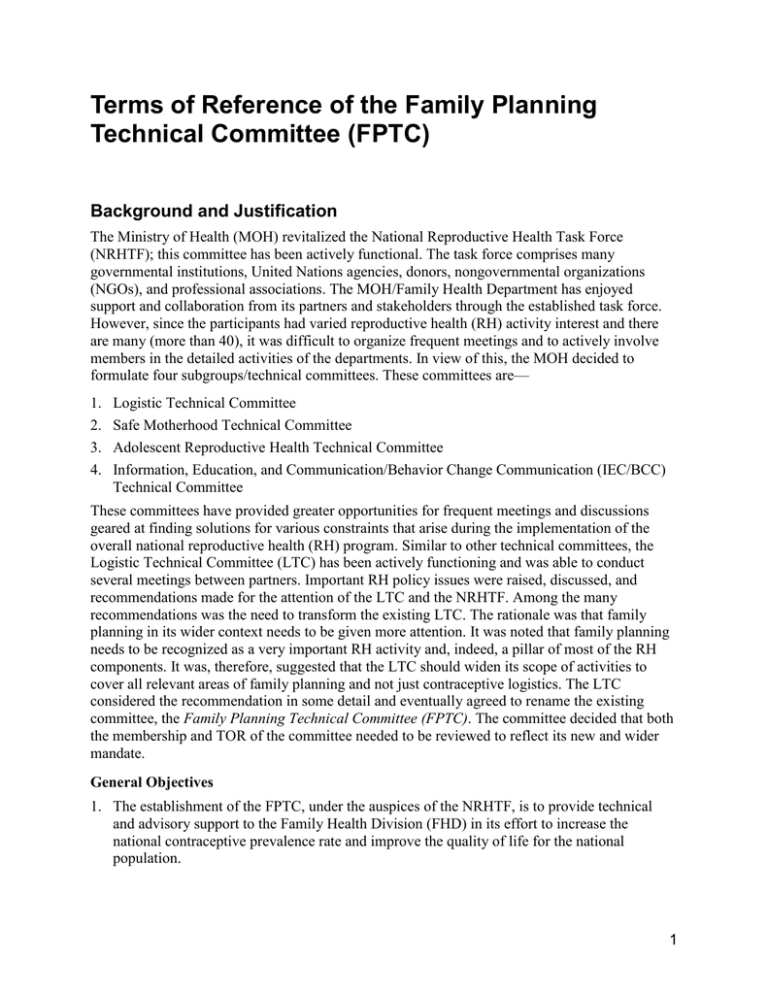Terms of Reference of the Family Planning Technical Committee (FPTC)
advertisement

Terms of Reference of the Family Planning Technical Committee (FPTC) Background and Justification The Ministry of Health (MOH) revitalized the National Reproductive Health Task Force (NRHTF); this committee has been actively functional. The task force comprises many governmental institutions, United Nations agencies, donors, nongovernmental organizations (NGOs), and professional associations. The MOH/Family Health Department has enjoyed support and collaboration from its partners and stakeholders through the established task force. However, since the participants had varied reproductive health (RH) activity interest and there are many (more than 40), it was difficult to organize frequent meetings and to actively involve members in the detailed activities of the departments. In view of this, the MOH decided to formulate four subgroups/technical committees. These committees are— 1. 2. 3. 4. Logistic Technical Committee Safe Motherhood Technical Committee Adolescent Reproductive Health Technical Committee Information, Education, and Communication/Behavior Change Communication (IEC/BCC) Technical Committee These committees have provided greater opportunities for frequent meetings and discussions geared at finding solutions for various constraints that arise during the implementation of the overall national reproductive health (RH) program. Similar to other technical committees, the Logistic Technical Committee (LTC) has been actively functioning and was able to conduct several meetings between partners. Important RH policy issues were raised, discussed, and recommendations made for the attention of the LTC and the NRHTF. Among the many recommendations was the need to transform the existing LTC. The rationale was that family planning in its wider context needs to be given more attention. It was noted that family planning needs to be recognized as a very important RH activity and, indeed, a pillar of most of the RH components. It was, therefore, suggested that the LTC should widen its scope of activities to cover all relevant areas of family planning and not just contraceptive logistics. The LTC considered the recommendation in some detail and eventually agreed to rename the existing committee, the Family Planning Technical Committee (FPTC). The committee decided that both the membership and TOR of the committee needed to be reviewed to reflect its new and wider mandate. General Objectives 1. The establishment of the FPTC, under the auspices of the NRHTF, is to provide technical and advisory support to the Family Health Division (FHD) in its effort to increase the national contraceptive prevalence rate and improve the quality of life for the national population. 1 2. The transformation of the LTC to FPTC will widen the scope of its mandate; rather than only looking at contraceptive logistic issues, it will also look at the overall national family planning activities Members of the Current LTC 1. 2. 3. 4. 5. MOH— Chairperson UNFPA USAID Pathfinder International EngenderHealth Term of Reference of the FPTC The FPTC is a sub-committee under the NRHTF, which was established based on the consensus reached during the third LTC. The FPTC is expected to look at the overall national family planning activities and to assist and support the promotion of the service throughout the country. Hereafter, the FPTC will work under the following Term of Reference (TOR): 1. Provide a forum that will ensure sustained networking among major stakeholders and family planning partners in the national family planning program. 2. Provide a forum for effective donor/stakeholder coordination with regards to planning and procurement of essential family planning commodities and supplies. 3. Review the existing workplan to ensure inclusion of activities that would adequately reflect the broader scope of activities of the reconstituted FPTC. 4. Review current membership to ensure reflection and inclusion of bodies relevant to the expanded scope of activities of the FPTC; bearing in mind, however, the need to keep the size of the committee to a manageable and effective number. 5. Ensure the establishment and implementation of a functional and effective national contraceptive logistic system, essentially by— Ensuring the collation and analysis of national logistic information from all stakeholders and the utilization of the information for more effective management of the contraceptive logistic system. Ensuring the appropriate and timely distribution of adequate quantities of commodities to all partners. Overseeing the management of the system and providing timely and appropriate guidance, as necessary. 6. Participate in the development of family planning technical policies, strategies, guidelines, and action plans of the family planning program. 7. Conduct advocacy work to ensure strong commitments of policy makers and community leaders in the promotion of family planning service in the country. 2 8. Provide support and advice in ensuring quality family planning service provision to the people. 9. Participate in strengthening and expanding the existing family planning community-level activities. 10. Participate in identifying and conducting (as required) of family planning operational and other research activities. 11. Assist in resource mobilization (medical supplies, commodities, etc.). 12. Assist and support capacity building of the central and regional program personnel. 13. Encourage production of relevant IEC/BCC materials for awareness creation and effective behavior change. 14. Participate in periodic review meeting and other program monitoring activities. * N.B.: This TOR shall be reviewed when deemed necessary. 3
